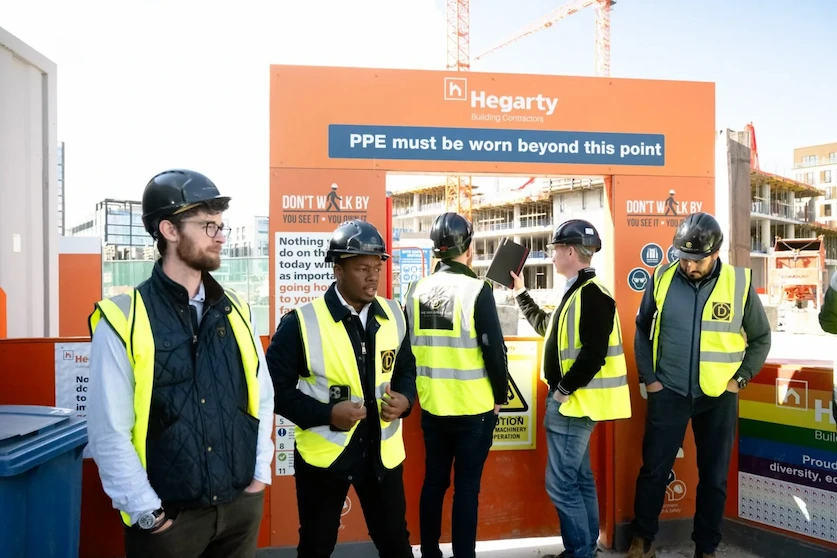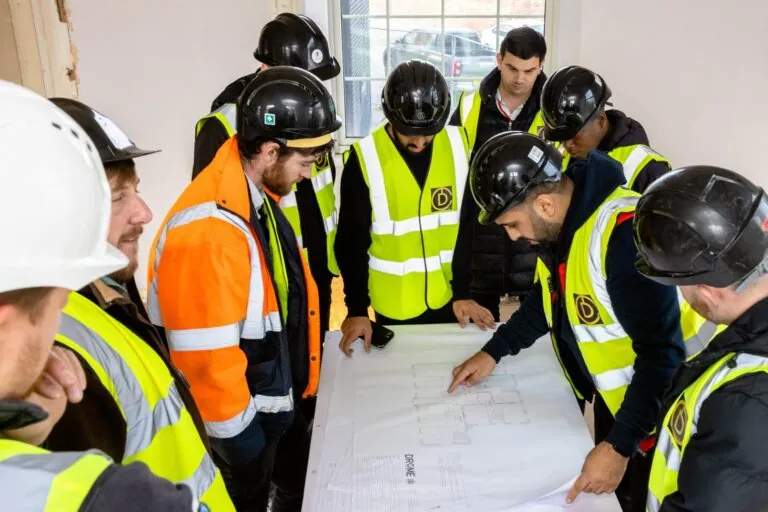Charlie’s Guide to Construction Recruitment Agencies
2025
Recruitment. It’s one of those topics that divides construction. Get it right, and you’ve got a team that gels, delivers results, and keeps your projects on track. Get it wrong, and you’ve got headaches, delays, and, if you’re unlucky, someone nicking tools off the site.
I’ve been in construction for over 15 years, and in that time, I’ve dealt with my fair share of recruitment agencies. I’ve seen it all, from a laborer who went on to become a company executive to another who we found on the first day sleeping behind a pallet of plasterboard.
Some agencies have been lifesavers – sending out top-notch tradies and site managers who’ve slotted into the team like they were always there. Others? Well, let’s say I’ve sent some guys home before they’ve even unpacked their tools.
In this guide, I’ll take you through what these agencies actually do, who uses them, and how to get the best out of them. We’ll cover fees, my own war stories, and, ultimately, whether they’re worth your time and money.
What Is a Construction Recruitment Agency?
Picture this: you’re knee-deep in a project, deadlines looming, and your lead electrician calls to say he’s broken his hand playing five-a-side. What do you do? Call your mates? Post on Facebook? That’s where construction recruitment agencies come in.
A good agency works like a matchmaking service for the building trade. They find skilled workers – whether you need a laborer for a few days, a plumber for a month, or a project manager for the next five years. They handle the legwork, from advertising roles to screening CVs and even managing payroll for temporary staff.
Well, that’s the theory anyway.
At their best, agencies save you time and energy, letting you focus on delivering projects. At their worst, they’re a waste of money, sending you workers who aren’t qualified – or even worse, pretend they’re qualified.
I once had an agency send me a “carpenter” who within minutes I could tell had no experience. His tool bag still had the label on it, his hammer was as shiny as the day it was purchased, and he needed to be told how to change the cartridge on a nail gun.
We sent him packing before the first tea break, I gave the recruitment agency an earful, and I thought that would be the end of it. Fast forward six months and the project is nearing completion. I phone the same agency in need of some extra painters and decorators. Who turns up, now claiming to be a painter? Yes – you guessed it – Mr. new trade every month.
Needless to say, we never used that particular recruitment agency again.

Photo by Charlie Fitzgibbon
Who Uses Construction Recruitment Agencies?
Honestly? Pretty much everyone in the industry. Small contractors use them to fill short-term gaps when workloads spike. Bigger firms rely on them for permanent hires, like site managers, estimators, and quantity surveyors.
Specialist subcontractors – think M&E, glazing, or roofing companies – often need an agency’s help to find niche skills on short notice. Developers use agencies to find project managers who can juggle spreadsheets and scaffolding schedules with equal finesse.
It doesn’t matter if you’re managing one small renovation or juggling multiple sites. Agencies offer flexibility, and that’s really what you’re paying for. But, as always, flexibility comes at a price.
Temporary Construction Labor
This makes up the bulk of where recruitment agencies operate within construction. Let’s say you’ve got a big job on and need an extra pair of hands (or ten). You call an agency, and by the next day, if they’re good, you’ve got people on-site, ready to go.
The best agencies will send you workers who are not only skilled but also a good fit for your team. I’ve had some great temps over the years, including a few who’ve gone on to become permanent members of the team. But I’ve also had my fair share of nightmares.
One time, I asked for a general construction laborer. Unfortunately, some agencies believe that a construction laborer is just anyone who wants a job, and fail to recognize it as a skilled person in their own respect.
The agency sent a lad who showed up in a football kit, swore he was “the best in the business,” and then spent half the day on his phone taking selfies around the site. The other half of the day he spent at home because that’s where we sent him after lunch.
That’s when I learned to always, always ask about the vetting process. A good agency will check qualifications, experience, and even references. A bad one will send whoever’s breathing.
Permanent Construction Placements
I have a love-hate relationship with recruitment. On the one hand, I enjoy meeting people in interviews, learning about their careers, and asking what they can potentially bring to the table. On the other hand, I hate that four out of five don’t turn up, lie on their CV, or whatever other time-wasting exercise they try on.
This is another place agencies can be a godsend. When it comes to permanent recruitment, a good construction recruitment agency should handle everything from advertising the role to shortlisting candidates, and some even conduct initial interviews. This saves you hours sifting through CVs, or letting your coffee go cold as you curse another no-show.
I once needed a quantity surveyor for a large project, and after a month of dead ends, I turned to an agency. Within a week, they found me a gem – sharp, efficient, and even had a bit of a sense of humor (rare for a QS, let’s be honest). This employee went on to head up the commercial team, compounding the investment we spent on the recruitment agencies fee.
And that’s a matter that does need some weighing up. Of course, permanent placements come at a cost. Agencies typically charge 10 – 20% of the candidate’s annual salary. That might seem steep, but when you consider the alternative – spending weeks finding someone yourself and potentially hiring the wrong person – it’s often money saved rather than spent.
How Much Do Construction Recruitment Agencies Cost?
Ah, the bit everyone hates talking about: the cost. For temporary workers, agencies usually charge a markup on the worker’s hourly rate. This markup can range from 10% to 25%, depending on the role and the agency.
For permanent placements, you’re usually looking at a one-off fee based on the candidate’s salary. It’s not uncommon to see agencies charging 15% or more. Before you panic, remember that a good agency doesn’t just find you a worker; they find you the right worker.
Here’s a tip: negotiate. Most agencies are open to discussing fees, especially if you’re a repeat customer or hiring multiple people. I’ve seen agencies reduce their fees to as little as 5% for larger firms providing repeat business.
And always read the fine print. I’ve seen contracts with sneaky clauses that make you liable for extra costs if a hire leaves prematurely.

Photo by Charlie Fitzgibbon
My Experience With Construction Recruitment Agencies
Over the years, I’ve learned a thing or two about making agencies work for me. The first lesson? Build relationships. Find two or three agencies you trust and stick with them. When they understand your business, they’ll find better candidates and work harder to keep you as a client.
That said, don’t be afraid to keep them on their toes. Always rotate between multiple agencies and let them compete for your business. You’d be amazed at how much effort they’ll put in when they know they’re not the only option.
Another lesson: ask the hard questions. How do they vet their candidates? What’s their process if someone doesn’t work out? Do they offer replacement guarantees? A good agency will answer these questions confidently. A bad one will fumble like a first-year apprentice on a Monday morning.
Managing and Tracking Labor Time
One thing I’ve learned the hard way is that managing agency labor isn’t just about getting bodies on-site – it’s about keeping track of what they’re actually doing once they’re there, and making sure you’re achieving bang for your buck.
Whether it’s ensuring you’re billed accurately by the recruitment agency, or making sure productivity matches what’s promised, tracking time is essential. I’ve seen it all: workers disappearing for hours, overtime claims that don’t quite add up, or simply losing sight of who’s on-site and when.
This is where a solid time tracking system makes a world of difference. Tools like Jibble let you monitor hours worked in real-time, giving you clear data on attendance and productivity. It’s especially useful for agency labor, where you don’t always have the same rapport or familiarity as you might with your regular crew.
By keeping everything logged and transparent, you can avoid awkward disputes with agencies and ensure every hour you’re paying for has actually been worked. It’s not just about accountability – it’s about peace of mind.
Should You Use Construction Recruitment Agencies?
So, are recruitment agencies worth it? In most cases, yes – but only if you’re smart about how you use them.
They’re invaluable when time is tight or you need specialist skills fast. They can save you from admin headaches and even help you find people you’d never have discovered on your own. But they’re not perfect, and they’re not all created equal.
Do your homework. Pick a few agencies with solid reputations and stick with them. Negotiate your fees, ask tough questions, and always have a backup plan. And remember: agencies are a tool. Use them well, and they’ll save you time and stress. Use them poorly, and you’ll end up cleaning up the mess.
At the end of the day, a recruitment agency is like a good tradesperson. They might cost you upfront, but if they do their job well, they’ll save you more than they cost in the long run. And isn’t that what we’re all looking for in this business?


